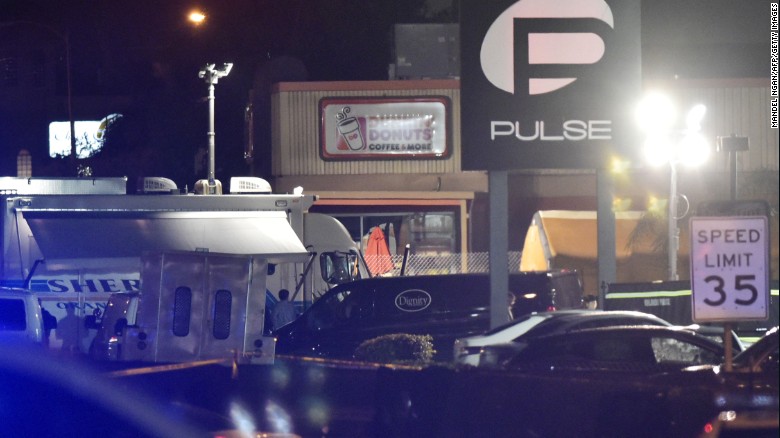


As the details continue to come to light in the horrific assault of an armed man upon a nightclub called “Pulse,” we are once again embroiled in shock, disbelief, anger, arguments about gun control, solidarity memes on Facebook, and a host of other responses in what seems to be a never-ending, each time worse than the last, awful cycle of violence heaped on the vulnerable.
My heart breaks when I think of what happened inside that club: the panic, the fear, the knowledge that someone wants to hurt you based upon their judgment of you. The desperate texts and calls to loved ones. The anguish of family members who did not know that their loved one was gay until that call from the police. From the hospital. From the coroner’s office. “Pulse” was a place where people could be freely themselves. Gloriously. I want to talk about why places like “Pulse” are necessary. In other words, why is there a need for a place to have church, outside of church? And when I say church, I mean a place of like-minded camaraderie, whole-hearted acceptance, and jovial fellowship.
We cannot deny that homophobia was a major component in what sparked the murderous rage that caused someone to bring a weapon capable of firing hundreds of rounds inside a crowded club during Gay Pride week.
Perhaps as we grieve this colossal loss of human life, this needless extinction of life force energy, we could give some attention to the ways our theologies have been harmful to our same gender loving, lesbian, gay, transgender, queer, questioning, intersex, asexual expressions of God. And if you don’t know what any of that means, here is a helpful link.
I’ve been in church all my life, and one thing I have heard over and over again, when it comes to homosexuality, is “love the sinner, hate the sin.” This is one of the biggest lies the church tells. You never hear this applied to liars, greedy folks, gluttons, judgmental tendencies or those among us who find fault as though there was a reward for it. Nope, we pull this one out when talking about our same gender loving sisters and brothers. Or whose identities we struggle to label. I used to argue that the only difference between a gay man and a straight man is the way they have sex. But then I considered that many heterosexuals also engage in and enjoy some of those same sexual practices, so… Bottom line: if your theology condemns homosexual sex but says little if anything about heterosexual sex, that’s a real problem. We need to stop acting as though God adds weight to some sins as if there was any such thing as small, medium and large sin. It all stinks the same.
I know I have been made to feel very uncomfortable with some of the fire and brimstone preaching against homosexuality I’ve heard, as though it were any worse than a lying tongue, hands that shed innocent blood, a heart that devises wicked plans, feet that hurry to evil, a lying witness and someone who sows discord in a family. See what I did there? Those are all things Proverbs 6: 16-19 says the Lord HATES. I did that for the folks who are quick to use the Bible to condemn homosexuality when we don’t obey that section of the Bible ourselves. You could go to prison for doing some of the things discussed in Leviticus. But I digress.
Back to “loving the sinner, but hating the sin.” When we use this type of terminology, it sends a clear message that there are degrees of sin that warrant hate. It tells homosexuals that they are not equal, that they are flawed, that they are somehow not worthy of the same rights we enjoy, and that we have to be reminded to love them. And that is not right. Period. Nope. That is a theology of convenience. Not one of love.
There was a time when the Christian church had to split because no one wanted people of color in their pews. This is something we should rightly be ashamed of. To this day we bear the remnants of that; we must never forget why a Black church was even necessary. There are reasons why church attendance has been on a steady decline for decades: the church’s slow response to our digital world, hypocrisy, and how we treat outsiders. Just sit in the wrong pew one Sunday and you’ll see what I mean. No one likes to feel as though they are being judged, and I have witnessed some hateful scorns from certain church folks when it comes to our same gender loving brothers and sisters. If we are not careful, we will be on the receiving end of the same disdainful glares we now give our intolerant grandparents on matters of race and gender equality.
We have to own that our intolerance and disdain may grant permission to hate. If we want to stand in solidarity, as we should, we need to dig deep and examine the ways our lack of action may have contributed to this culture of intolerance, to examine the ways our biblical interpretations and narrow readings of Scripture have been harmful, and to examine the ways our silence in the fight for gay rights has contributed to the levels of contempt our brothers and sisters deal with daily.
Intolerance was not the way of the Christ. Jesus was on the side of the oppressed. Always. When Jesus came to earth, he came as one of the oppressed. Our job as Christians is to be unashamed of the gospel, not to be a shame to the gospel. What can we do in such a time as this? Reflect. Revise. Rethink. Repent. Embrace.